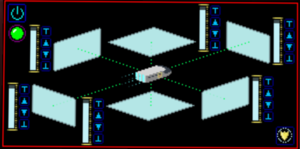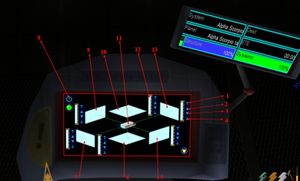Shield Station
| This section is in need of revision. Please help improve it or discuss these issues on the talk page. The reason given is: New more up-to-date images needed. Need missing button icons. The page talks a lot about how shields work, but note much about how to use the console. |
| Shield Station |
|---|

|
The shield station controls the shields of the spacecraft. Shields function as a defensive barrier that can absorb some or all damage directed at the spacecraft. Shields also make the spacecraft hull impervious to transporter beams.
Controls are activated by clicking on the console using the hand cursor. Controls also have corresponding keyboard equivalents. Help about using the hand cursor and a table showing the key commands for this station can be found on the Controls#Shield_Station page.
Shield
| This section has details missing or obscure mechanics that need clarification by Haxus. Description: Numbers here are from the old manual. Need confirmation rather or not they are still correct. If you know the answer, please edit this page or state it on the talk page! |
A separate shield protects each of the six facing directions: front, back, left, right, top and bottom. Each shield facing has its own capacitor, similar to the spacecraft's main capacitor. Energy in a shield's capacitor is used to absorb and dissipate the effects of damage directed at the spacecraft. Each unit of energy in the shield capacitor absorbs 50 units of damage.
Console

Power level of each shield capacitor is shown as a vertical bar graph. There are six bar graphs, one for each shield capacitor. The size of the shield capacitor at each facing is equal to the total number of functioning shield units in the spacecraft design. In a design with 90 shield units, the front shield capacitor holds 90 units of energy, the back shield capacitor holds 90 units of energy, and so on.
The six shield capacitors are interconnected. This enables energy from one shield's capacitor to be instantly transferred to any or all of the other shield capacitors. A shield button at the bottom right corner of the panel causes all available shield energy to be distributed evenly between the six shield capacitors.
Next to each bar graph is a set of four buttons for transferring power between shield capacitors. Maximum shield energy is directed to a facing by using the top control. All shield energy is directed away from a facing by using the bottom control. Shield energy to a facing is increased by pressing the up arrow. Shield energy to a facing is reduced by pressing the down arrow.
Shield energy is distributed to other facings when the energy to a facing is reduced. Likewise, shield energy is taken from other facings when the energy to a facing is increased.
The power to the shield system is turned on and off using the power button at the top left of this station. The shield system must be powered on for shields to absorb damage from energy weapons. The shield system must also be powered on for the shield capacitors to recharge.
Shield Recharge
Energy is consumed from the spacecraft's main capacitor to recharge the shield capacitors. Shield capacitors recharge at the rate of six energy units per second, distributed between all shield capacitors that need power. If all shield capacitors are empty, each capacitor recharges one energy unit per second. A spacecraft with 90 shield units will take 90 seconds to recharge all shield capacitors from empty. When all shield capacitors are full, no energy is consumed from the spacecraft's main capacitor to maintain the shields until the energy in a shield capacitor is reduced by damage effects. Shield energy is not lost from shield capacitors when the shield system is turned off.
Misc
